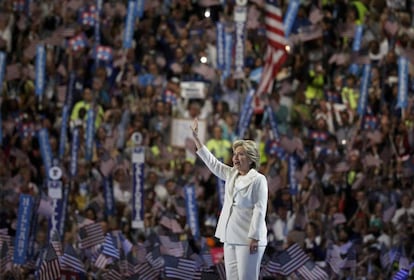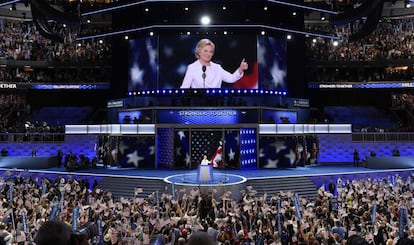Hillary Clinton promises “steady leadership” at a decisive moment in US history
The first woman to be nominated for president by a major party formally accepts the responsibility to lead Democrats, warning against the dangers Trump poses to the country


Hillary Clinton has accepted the Democratic Party nomination to stand for president in November’s presidential election, a “decisive moment” in the history of the United States as the country faces the possibility of a Donald Trump presidency. The former secretary of state and first lady promised to create more jobs with rising wages and presented herself as the presidential candidate who will provide “steady leadership” in a troubled world as opposed to rash men, like her Republican rival, who are “moved by fear and pride.”
Clinton reminded the crowd of the founding fathers’ mission and their motto, pluribus unum or “out of the many, we are one.” She accused Trump of dividing Americans from each other and from the rest of the world. She compared this time in history to the beginning of the American Revolution in Philadelphia, the birthplace of American democracy, when the future of the states was uncertain. And, like President Barack Obama did the night before, she launched a patriotic and optimistic message as an alternative to the catastrophic vision presented by Trump, a man she claimed brought the Republican Party from "Morning in America” —the 1984 Ronald Reagan slogan— to "Midnight in America."
She delivered her speech against the competing hum of a group of vocal protestors, concluding the Democratic National Convention and launching the next phase of the campaign. An unprecedented campaign: the former first lady will compete with a politician who has far less experience than her in politics and the inner workings of the government of the most powerful country in the world.
The former first lady will compete with a politician who has far less experience than her in politics and the inner workings of the government.
Clinton’s acceptance speech was an opportunity to speak to millions of Americans who were watching on TV at home. She had to reintroduce herself to a country that already knows her well and prove the old adage “you never get a second chance to make a good first impression” wrong. It was not easy. Clinton has been in politics or close to political figures like her husband, former President Bill Clinton, for four decades. Her popularity ratings are low; only Donald Trump rates lower than her. And, over the last few weeks, Republicans have lashed out against her in hysterics that inspired an unofficial slogan at the Republican National Convention in Cleveland: “Lock her up.”
Clinton, like the main speakers who took the stage over the last four days, described the November 8 election as an existential trial for the nation. Trump promotes confrontation at home – a position that is at odds with both Republican and Democratic ideals – and isolation in foreign policy. Clinton, on the other hand, wants the United States to maintain its global influence and promises to work to build unity among Americans at home.
Clinton supporters have framed the presidential campaign as a referendum: Trump or no Trump. The Democratic nominee gave a few hints about the strategy she will use against the unusual politician whom Republican rivals in the primaries could not beat. She, on the other hand, will not back away from a head-to-head confrontation. She will work to destroy him.

“Does Donald Trump have the temperament to be Commander-in-Chief? Imagine him in the Oval Office facing a real crisis,” she said. Then she reminded Americans of what Jackie Kennedy said her husband told her before the Cuban Missile Crisis: he was worried “that a war might be started-- not big men with self-control and restraint, but by little men – the ones moved by fear and pride.”
In response to Trump’s gloom and doom vision of the country, Clinton quoted Franklin D. Roosevelt: “The only thing we have to fear is fear itself.” She added, “We will rise to the challenge, just as we always have."
Lack of confidence
It was important for Clinton, a politician who rarely uses flowery language and lacks the charisma of Bill Clinton and Barack Obama, to contrast Trump’s vague remarks with her own clear proposals. Her command of politics and economic issues are undermined by a seeming lack of empathy and confidence that several speakers, including Bill on Tuesday and their daughter Chelsea who introduced her on Thursday night, tried to make up for in order to humanize her.
“My primary mission as president will be to create more opportunity and more good jobs with rising wages right here in the United States,” she said. “Especially in places that for too long have been left out and left behind. From our inner cities to our small towns, from Indian Country to Coal Country. From communities ravaged by addiction to regions hollowed out by plant closures.”
It was a speech written for those who voted for Bernie Sanders, her rival in the Democratic primaries. And it spoke to the quintessential Trump voter, too: the white working class man who has been beaten down by the winds of globalization.
Sign up for our newsletter
EL PAÍS English Edition has launched a weekly newsletter. Sign up today to receive a selection of our best stories in your inbox every Saturday morning. For full details about how to subscribe, click here
Several Democrats who took the stage before her spoke about foreign policy. Retired United States Marine Corps General John Allen struck a patriotic and warrior-like tone as he praised her character and compared the level of experience and knowledge she would bring to her leadership of the armed forces with Trump’s ignorance and unpredictable temperament. “From Baghdad and Kabul, to Nice and Paris and Brussels, to San Bernardino and Orlando, we're dealing with determined enemies that must be defeated. No wonder people are anxious and looking for reassurance. Looking for steady leadership,” Clinton said.
Progressive on domestic policy and tough on foreign policy; Clinton is bringing back the Democratic Party of Roosevelt and Truman.
English version by Dyane Jean François.
Tu suscripción se está usando en otro dispositivo
¿Quieres añadir otro usuario a tu suscripción?
Si continúas leyendo en este dispositivo, no se podrá leer en el otro.
FlechaTu suscripción se está usando en otro dispositivo y solo puedes acceder a EL PAÍS desde un dispositivo a la vez.
Si quieres compartir tu cuenta, cambia tu suscripción a la modalidad Premium, así podrás añadir otro usuario. Cada uno accederá con su propia cuenta de email, lo que os permitirá personalizar vuestra experiencia en EL PAÍS.
¿Tienes una suscripción de empresa? Accede aquí para contratar más cuentas.
En el caso de no saber quién está usando tu cuenta, te recomendamos cambiar tu contraseña aquí.
Si decides continuar compartiendo tu cuenta, este mensaje se mostrará en tu dispositivo y en el de la otra persona que está usando tu cuenta de forma indefinida, afectando a tu experiencia de lectura. Puedes consultar aquí los términos y condiciones de la suscripción digital.








































